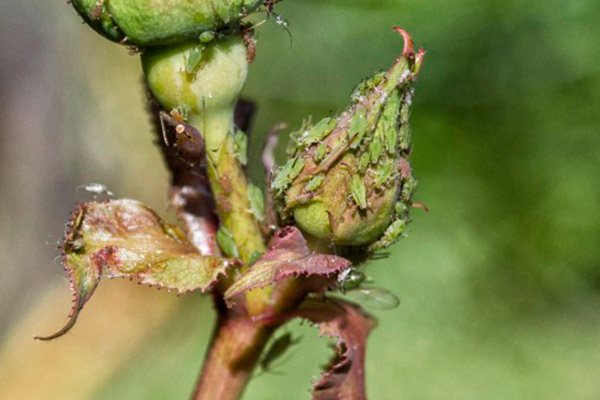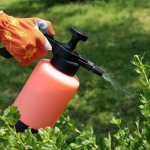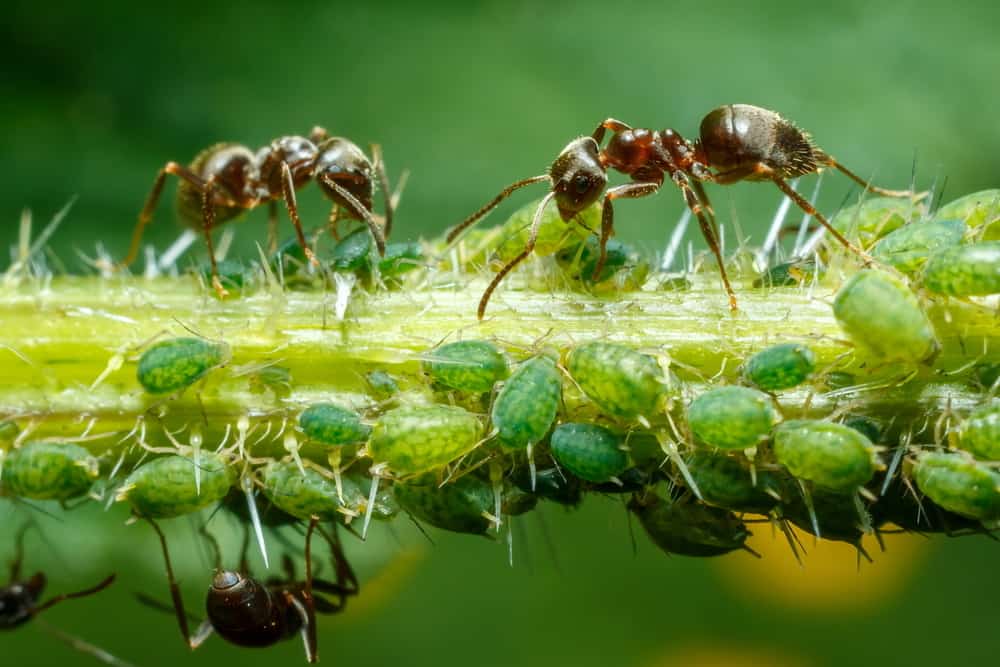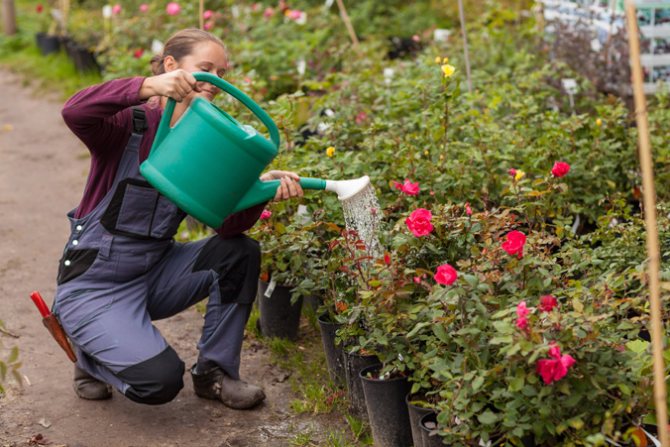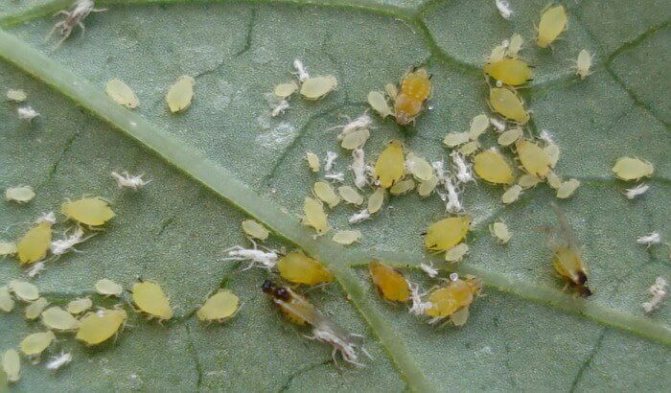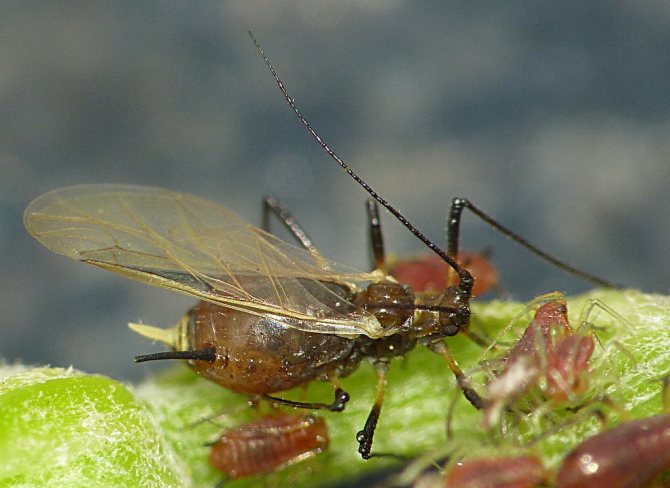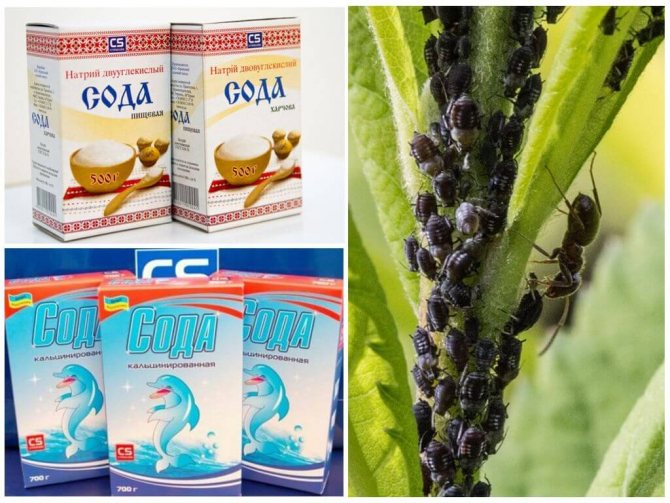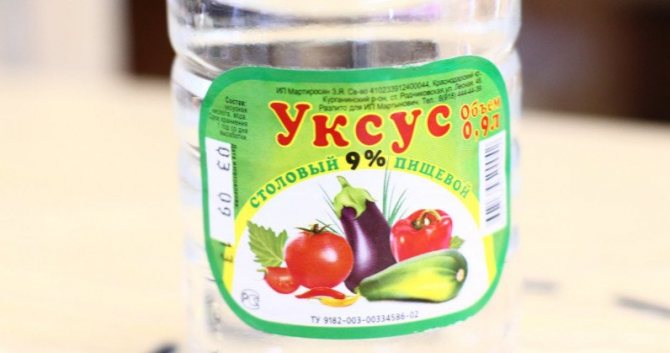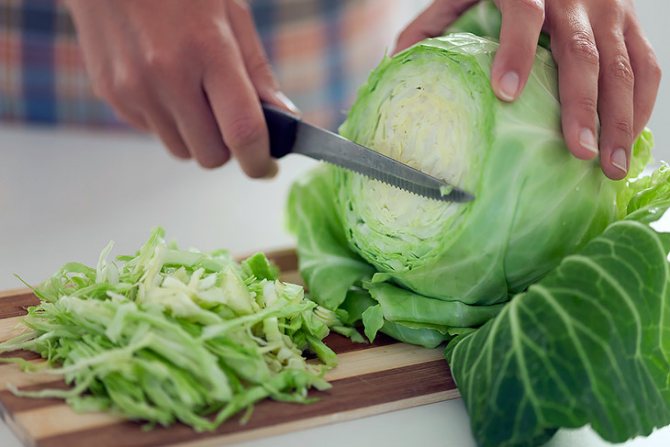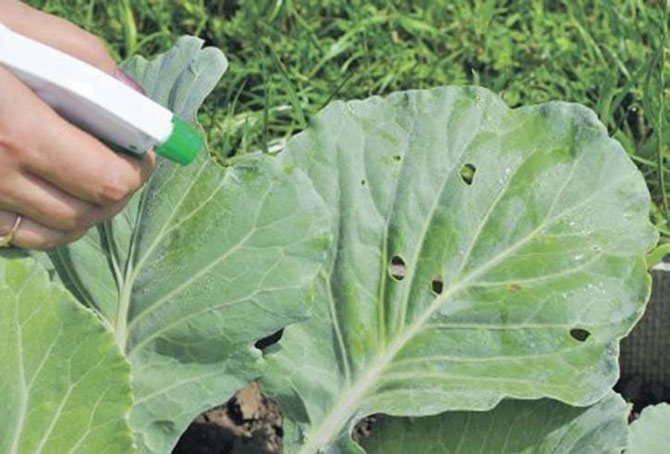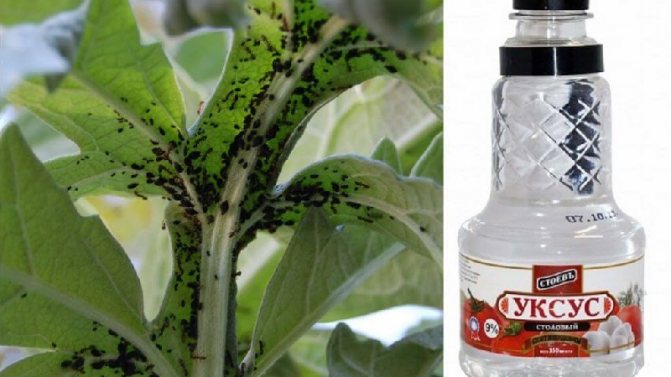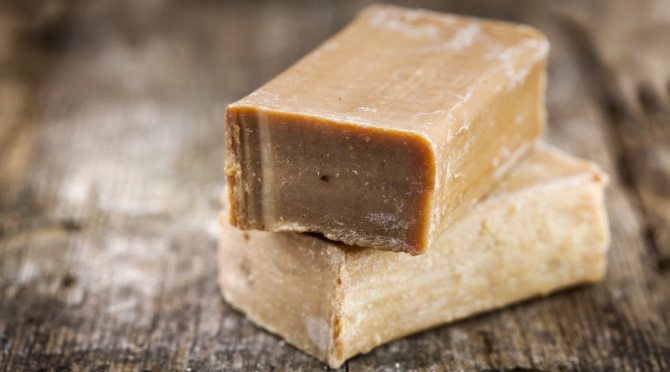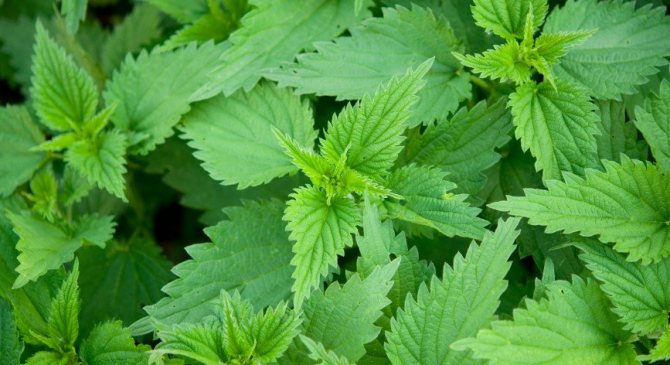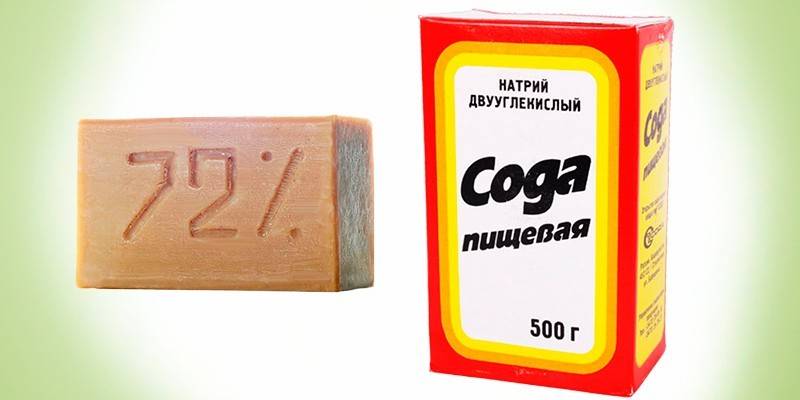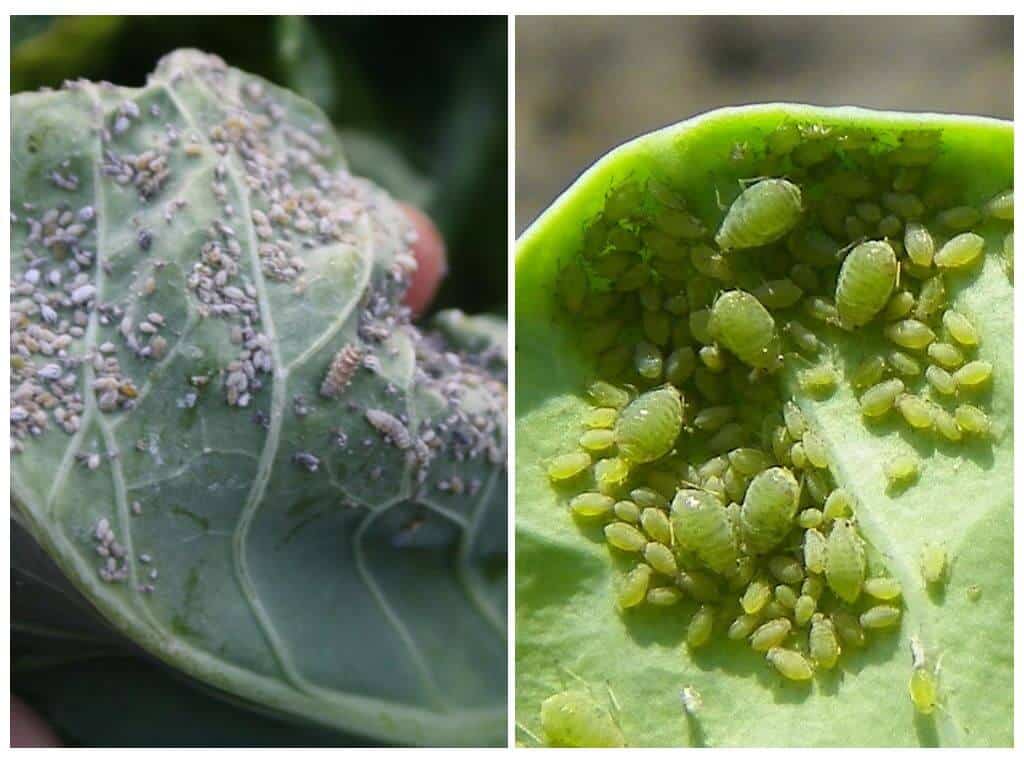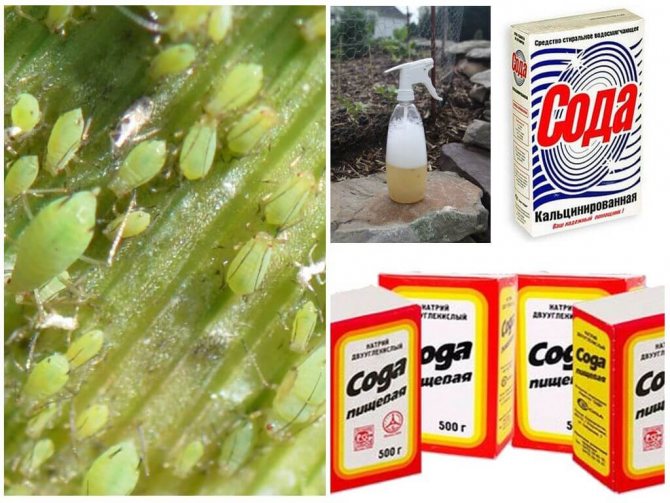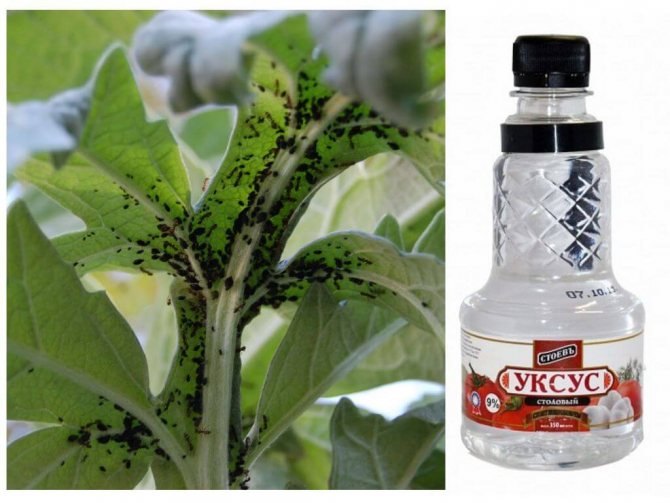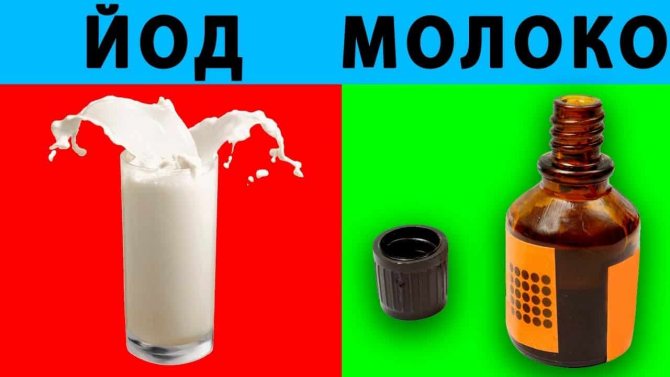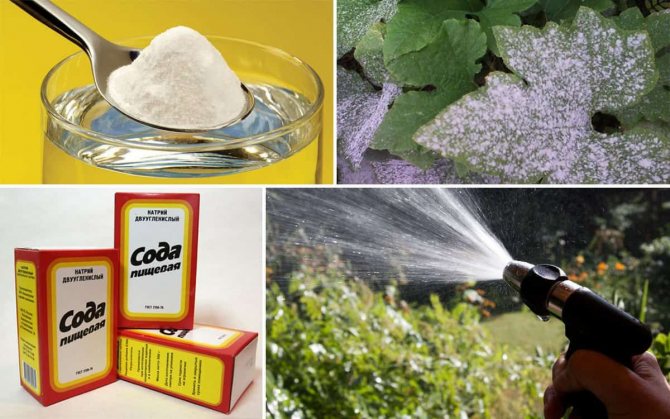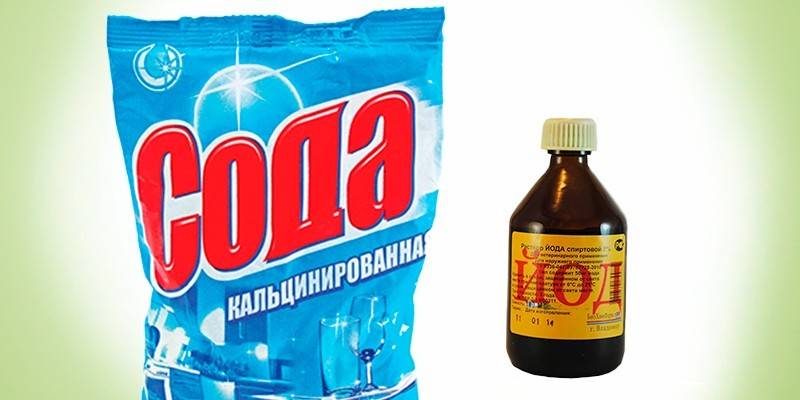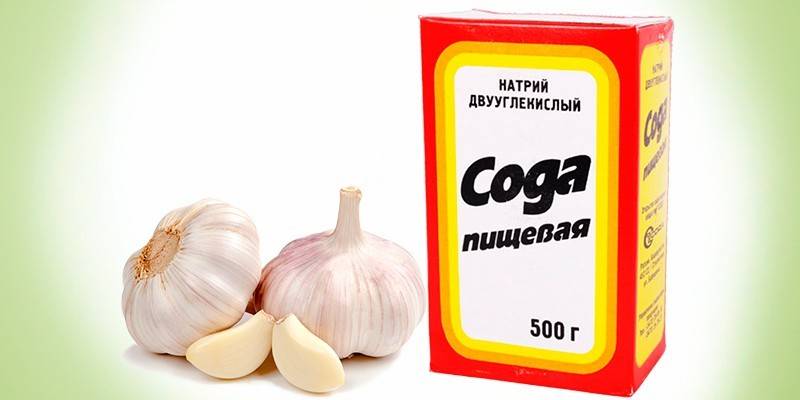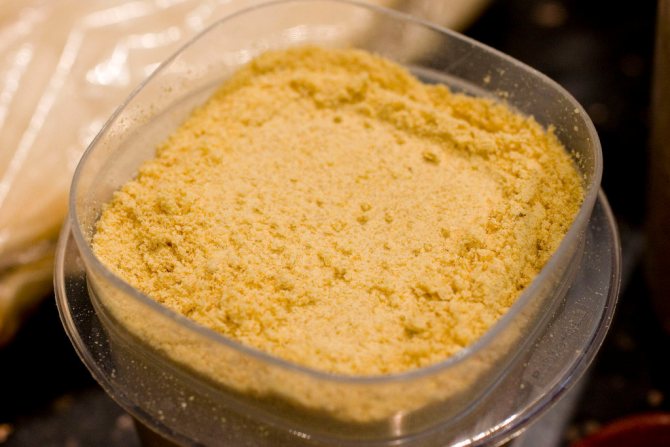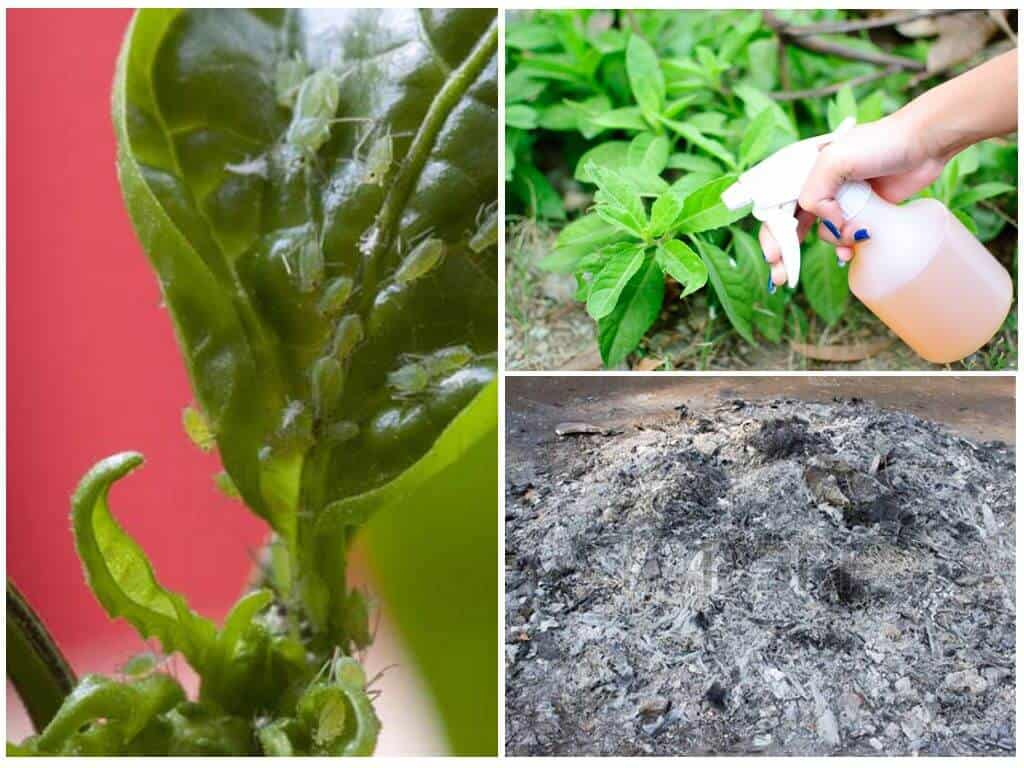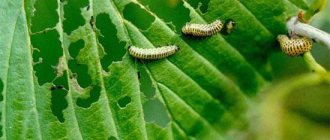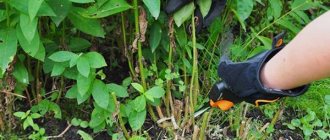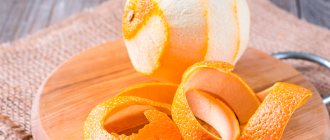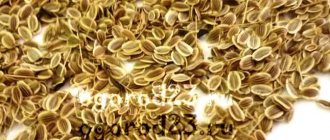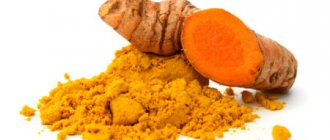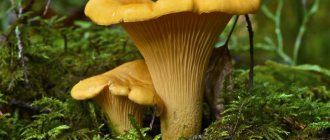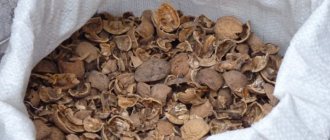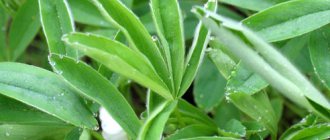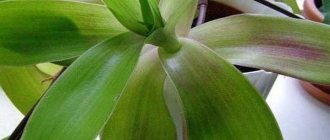Soda for aphids is one of the oldest, proven remedies for pests in garden, horticultural crops. The advantages of the product are quick results, benefits for plants. The substance increases productivity, protects against many diseases, molds, as it is a strong bactericidal substance. To combat aphids, baking soda ash is used. Most often it is treated with:
- fruit trees (including apple, pear, plum and cherry);
- roses;
- currants;
- cucumbers;
- tomatoes;
- pepper;
- cabbage;
- viburnum;
- dill;
- raspberries;
- indoor plants, etc.
Which one to choose
- Baking or baking soda (sodium bicarbonate / sodium bicarbonate, NaHCO3) is a product that has long settled in our homes. In fact, it is a soft alkali, harmless to humans, pets and plants. A great helper in cooking, at home, in the garden and garden.
- Calcined is used more often for domestic needs: to whiten or clean something. Requires dissolving in hot water. Thanks to the decay product of this soda - carbonic acid - plants better absorb minerals that are formed in the soil after the decomposition of organic matter.
- Caustic is a strong alkali. You need to handle it with extreme caution! Otherwise, you can get severe chemical burns that are difficult to heal. In everyday life, it is used for cleaning sewers and in the fight against complex fatty contamination.
Using vinegar to combat aphids
You can destroy the pest mechanically - by washing it off with water, removing it by hand, but such methods are ineffective. You can resort to the help of insects and birds that eat it. To do this, arrange feeders in the garden, sow herbs that attract beneficial insects. It will also be possible to defeat the pest with the help of various preparations for its destruction. There are special chemicals - Arrow, Fitoverm, Intovir and other drugs. However, they are expensive and toxic, and besides, special tools may not always be at hand.
You can use vinegar for the same purpose. It is absolutely safe and affordable due to its low cost. The natural product does not affect the development of the plant, does not require special skills when spraying.
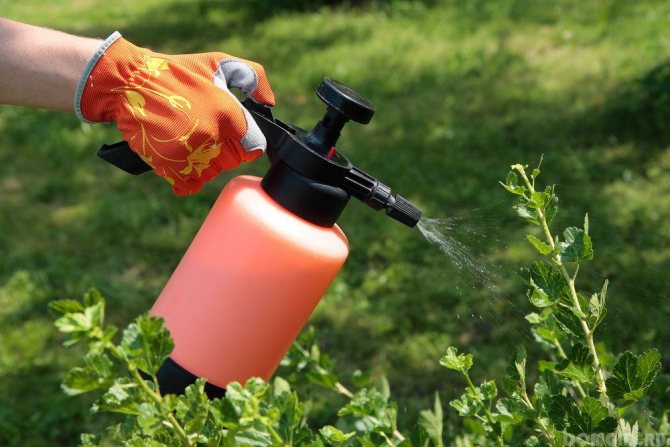
Boric acid solution for spraying tomatoesWe grow crops in the country in order to get environmentally friendly products. Such vegetables and fruits have an effect on ...
Acetic acid solutions are suitable for spraying fruit trees, currant bushes, cucumbers, tomatoes, cabbage, peppers, dill, and flowers. Spraying should be carried out at intervals of 3-7 days, then - as needed. In most cases, it is sufficient to process crops once every 3 weeks. In addition, vinegar can fully replace fungicides. This is the prevention and treatment of fungal diseases of plants.
Fertilizing roses
For feeding roses, a foliar method is used, aimed at building up the green mass.
The procedure is carried out by spraying the leaves: in 1 liter of settled warm water, dilute 1 tbsp. l. soda. Process the ornamental bushes with the resulting solution.
Attention! Foliar fertilization should be done early in the morning or in the evening, when there is no direct sunlight, or in cloudy weather, so that the leaves do not get sunburned.
Soda top dressing not only stimulates the growth of foliage, but also serves as a prophylaxis against pests and diseases that affect plants in early summer.
Seed dressing
Vinegar is used to accelerate seed germination. The use of the substance speeds up the process in half.
To do this, take vinegar and plain water. Mix in a 1/9 ratio. Moisten a cloth or cheesecloth with the resulting solution and place the seeds. The length of time the seeds sit in the vinegar-soaked tissue depends on the plant.
Does vinegar help speed up seed germination?
Well no
Seeds of parsley, dill, parsnip and other plants that take a long time to sprout are in gauze for at least 24 hours. For seeds of tomatoes, peppers and eggplant, 12 hours is enough, for seeds of cucumbers, pumpkins and zucchini - 8 hours.
After the specified time has elapsed, remove the seeds, dry them and plant them in the soil.
Disease protection and treatment
From aphids
How to understand that aphids have settled in your garden? Take a close look at young shoots and tops of trees and bushes:
- Insects settle on them, deforming the leaves, punching the green mass and drawing out the sap from the plant.
- If, during the flowering period, the buds begin to fall to the ground, pre-twisting, this is a sure sign of the presence of pests.
- The leaves and branches of trees are covered with a sticky substance - honeydew.
- When a gallic variety (for example, on currant bushes) attacks, characteristic swelling appears on the leaves - galls.
Aphids in the garden, especially during flowering or fruiting, are very dangerous. Pest control is complicated by the fact that chemicals cannot be used during these periods.
Soda comes to the rescue again.
- Take 1 tbsp. l. with a slide of baking soda (tea) and 1/4 part of a standard bar of laundry soap. Grate or chop in any other available way. Pour 1 liter of boiling water and stir until smooth - you get a concentrate. Dilute with a bucket of cold water. Aphid spray agent is ready.
- Gardeners consider soda ash more effective. Stir 2 tbsp. l. means in 10 liters of water, add 1 tsp. iodine and 30-40 g of soap. Spray the resulting solution onto damaged plants.
- Pour 150 g of chopped garlic with 10 liters of water, let it brew for 6 hours. Then add 2 tbsp. l. soda ash (or 10 tbsp. l. food grade) + 100 g of laundry soap. The soda solution is ready to use.
- Dissolve 10 tsp. apple cider vinegar in 10 liters of water. Add soap shavings.
- Dilute 50 ml of ammonia (ammonia) with 10 liters of water, add a pinch of washing powder or 100 g of soap. Spray the resulting solution on each leaf of the plant on both sides.
- Dissolve 300 g of ash in 10 liters of hot water. For better adhesion to the surface of the leaves, you can add 50 g of soap.
Reference. When foliar treatment of plants, after drying, the soap allows the solution to stay on the leaves longer. Therefore, any soap product is suitable for preparing the composition: laundry soap, tar, liquid soap, washing powder and even dish detergent.
Increase the chances of combating aphids with active ingredients that can be added to the main composition. For example, garlic, vinegar, ash, ammonia.
When working with solutions containing ammonia, use protective gloves and a respirator.
Soda + iodine + soap
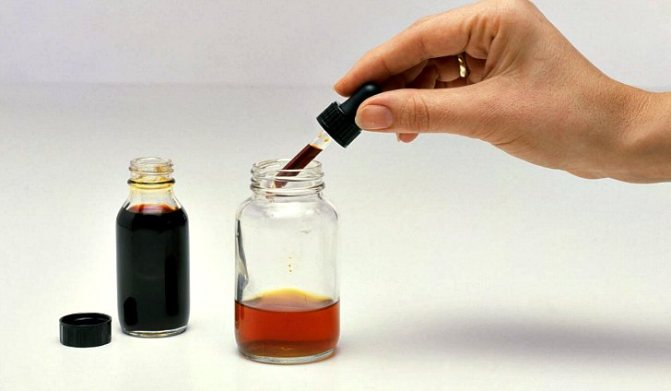

Supplementing soap and soda with iodine expands the list of positive properties.
The improved composition clearly demonstrates the following qualities:
- destruction of aphids;
- acceleration of healing (regeneration) of damaged areas;
- prevention of plant infectious diseases.
The sequence of steps is as follows:
- bring the water to a temperature of 38-40 degrees Celsius;
- put crushed soap into it (the required proportions are 400 grams per bucket of liquid);
- add the resulting duo with iodine and sodium bicarbonate at the rate of 1 teaspoon and 10 tablespoons per 10 liters of liquid, respectively.
For convenience, all components in the required amount are added to the minimum volume of water. After their complete dissolution, the missing liquid is poured in.
From rust, spotted and powdery mildew
Powdery mildew is a fungal disease in the form of a white coating on leaves and fruits. Wet weather, poorly ventilated thickened plantings and excessive watering contribute to its spread.
Spotting is most often caused by fungi. All deciduous plants, from trees to lawn grass, are subject to diseases.
Rust is also fungal in nature. At first, small, rusty-brown spots appear on the leaves. But very quickly the disease affects the entire leaf, after which it dries up and falls off.
Effective Antifungal Soda Recipes:
What kind of insect aphid is, and how is it dangerous for cucumbers
Aphids - a superfamily of insects from the order of Hemiptera... More than 4,000 species are known, of which almost 1,000 live in Europe. The appearance and distribution is possible with any method of growing cucumbers: in spring in greenhouses and greenhouses, in summer in open ground.
Favorable conditions for the reproduction of parasites - regions with a humid warm climate... However, pests are resistant to weather conditions: they can exist and multiply in a wide range of temperatures, with different air humidity.
Aphids feed on plant sap, affecting all its aboveground parts: flowers, leaves, ovaries, fruits, can spread viruses, cause pathological formations in plants (galls). Gauls weaken the plant, slow down fruiting, can lead to its death and, accordingly, loss of yield.
For reference. You can protect plantings by choosing the right cucumber variety that is resistant to pests and diseases.
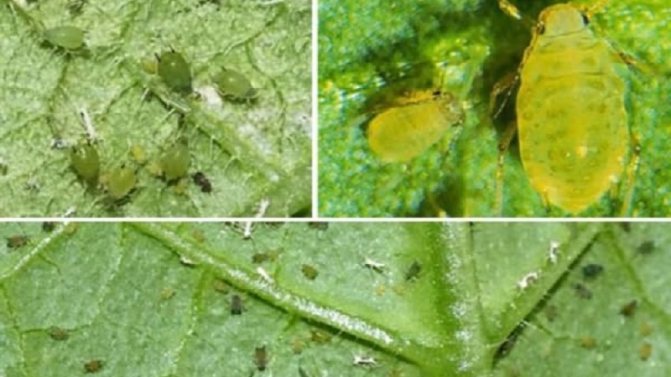

What kind of aphids affects cucumbers
The main pest of cucumbers is melon, or cotton aphid... It is a small insect, body length is 1-2 mm. Some individuals reach 5 mm. The species contains winged and wingless forms. The body color is different, ranging from light yellow to rich green, almost black. Each individual has a proboscis, which pierces the surface of leaves and shoots.
Melon aphid development begins in springwhen a larva hatches from eggs laid on the host plant in the autumn. The larva feeds on the sap of the plant, and after molting begins reproduction. During the summer, one female reproduces more than 10 times, more than 500 individuals of winged and wingless forms can appear from her. In autumn, winged females fly to a weed plant, where they begin laying eggs for the winter.
Interesting. Insects are sedentary, but move fast enough. Winged individuals can travel long distances and create colonies in new places.
From gray rot
Gray rot is another common dangerous fungal disease that first affects the stalk, and a little later - the entire surface of the fruit. A gray-colored spot appears, the fruit is covered with a gray fluff - fungal spores.
- In 10 liters. dilute water with 1 tbsp. l. soda ash and surface watering the affected plants. Repeat the treatment several times, but not more often than once every 2 weeks.
- A solution similar to Bordeaux mixture - Burgundy liquid.Combine copper sulfate and soda ash in dry form in equal proportions. Dissolve 150 g of the resulting powder in 10 liters of water. Treat the rose bushes with a freshly prepared solution.
Spraying rules and precautions
- In order for the spraying procedures to bear the expected results, process the plants in the morning or evening hours, in dry, cloudy weather. If rain is expected, your efforts will be in vain, as the raindrops will immediately wash away the solution.
- For the same reason, refrain from watering the plants for the next 2-3 days.
- Treatment of plants with products containing soda, vinegar, ammonia alcohol and other aggressive components must be carried out in compliance with safety measures. Use gloves and a respirator to protect against possible burns if the concentrated solution comes in contact with the skin or respiratory tract.
Garlic + soda + soap
The desire of "land" workers to preserve the fruits of their labor awakens in them a desire for experimentation. One of the latter is the use of garlic against aphids.
It is a natural product with pronounced antibacterial properties. Its pungent and aggressive smell makes the pests leave the garden plot.
Preparation of the product consists in the following sequence of actions:
- prepare one glass of garlic gruel (you can achieve a chopped state by using a kitchen grater, knife, garlic);
- add it to a bucket of water;
- leave to infuse for 6 hours;
add 100 grams of laundry soap and 10 tablespoons of sodium bicarbonate to the liquid; stir until the last two ingredients are dissolved.
Recommended for you:
How to get rid of unpleasant shoe odor with baking soda at home
Soil deacidification
To determine the acidity of the soil around the rose bushes, take a handful of soil and sprinkle it with vinegar. Neutral or slightly acidic will hiss, covered with bubbles, acidic will remain unchanged.
If the soil in your area is acidic or slightly acidic, the same soda will come to the rescue. Due to its fine dispersion, sodium bicarbonate quickly dissolves in the soil, reducing its acidity.
To do this, simply spread the baking soda over the surface in a very thin layer, and then sprinkle with water.
Is it worth resorting to pesticides
It is highly undesirable to fight the pest using chemicals. When processing fruit crops, chemicals enter the ground, are absorbed by the plants, and then penetrate into the fruit. For indoor plants in a house or apartment, this is generally unacceptable. However, in extreme cases, when the aphid has already multiplied so much that it threatens the plant with death, the insecticide justifies its use.
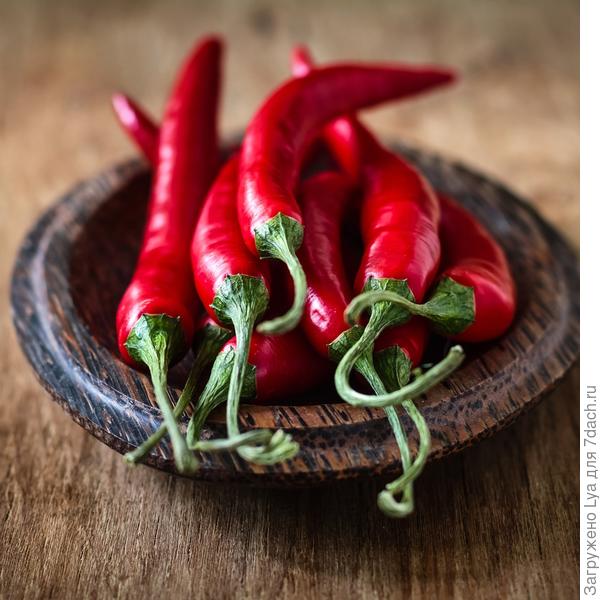

Before using any insecticide, it is necessary to study the instructions, since an incorrect dosage or violation of safety measures can significantly harm both the treated plant and the person. If everything is done correctly, then the small malicious enemy will cease to be a threat to your plants.
Tips from experienced florists
- The sodium in baking soda can accumulate in the soil, which negatively affects the condition of the roses. Try not to overdo it.
- Ants on the site are a real scourge for gardeners. They "graze" aphids, contributing to their reproduction. But it is enough to sprinkle the anthill with soda, as in a day the insects will escape from your site.
- Cut roses will stay fresh longer if you add 1 tsp to the vase. soda for 1.5 liters of water.
- Remember to remove diseased or damaged leaves when treating bushes.
What are the benefits of this popular condiment?
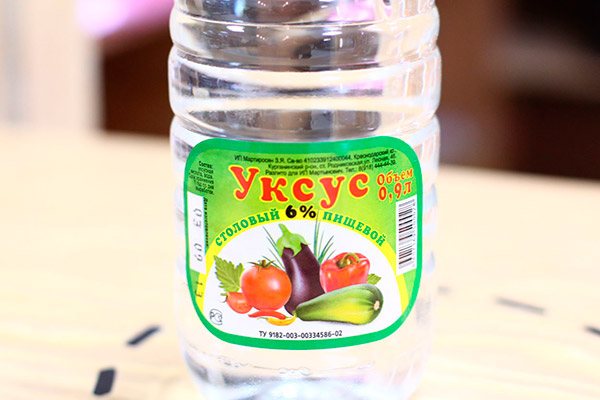

Have questions? Ask and get useful advice from professional gardeners and experienced summer residents. Ask a question >>
Vinegar is an effective method of combating aphids, the effectiveness of which has been tested by many gardeners.Why is it considered one of the best aphid remedies?
Yes, because aphids and other pests do not like its smell, and the acetic, citric, malic, tartaric and other acids included in it literally corrode the body of the pest, thereby destroying it.
